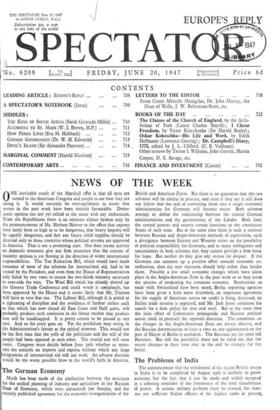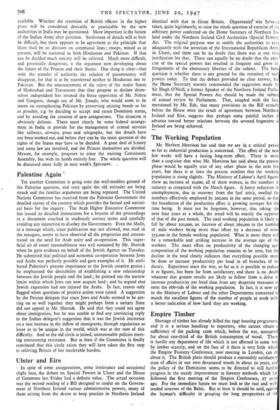The Problems of India
The announcement that the withdrawal of the 15,000 British troops in India is to be completed by August 15th is unlikely to prove accurate, but the fact that it can be made and widely accepted is a sobering reminder of the imminence of the total transference of power. A serious military problem must be created, for there are not sufficient Indian officers of the highest ranks at present. available. Whether the retention of British officers in the higher posts will be considered desirable or practicable by the new authorities in India may be questioned. More important is the future of the Indian Army after partition. Settlement of details will at best be difficult, but there appears to be agreement to the principle that there shall be no division on communal lines ; trooPs, mixed as at present, will be stationed in both Hindustan and Pakistan. If that can be decided much anxiety will be relieved. Much more difficult, and potentially dangerous, is the argument now developing about the future of the Princes and their States. One thing is clear—that with the transfer of authority the relation of paramountcy will disappear, for that is to be transferred neither to Hindustan nor to Pakistan. But the announcement of the rulers of the major States of Hyderabad and Travancore that they propose to declare them- selves independent has aroused the fierce opposition of Mr. Nehru and Congress, though not of Mr. Jinnah, who would seem to be intent on strengthening Pakistan by preserving existing bonds so far as possible, e.g. by deciding to accept and retain Dominion status, and by avoiding the creation of new antagonisms. The situation is obviously delicate. There must clearly be some federal arrange- ment in India to provide for the management of central services like railways, airways, posts and telegraphs, but the details have not been worked out, and before they can be the main question of the rights of the States may have to be decided. A great deal of history and some law are involved, and the Princes themselves are divided. Mysore, for example, proposes to enter the existing Constituent Assembly, but with its hands entirely free. The whole question will be discussed more fully in next week's Spectator. .



































 Previous page
Previous page